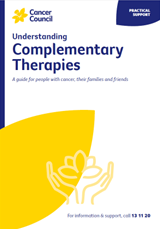- Home
- About Cancer
- Living well
- Complementary therapies
- Safety concerns
- Telling your doctors about using a therapy
Telling your doctors about using a therapy
Studies show that most people with cancer who use complementary therapies don’t tell their doctors. This is because they worry their doctors will disapprove.
The use of complementary therapies is growing, so many doctors are now better informed about them and are often supportive of their use. Some doctors and nurses have been trained in complementary therapies and are able to give you information about them. Complementary therapies are also available at some cancer treatment centres.
To keep yourself safe, have the following conversations:
Talk to your doctors
It is important to discuss your interest in complementary therapies with your GP, cancer doctors and nurses. Let them know about any specific therapies you are using or thinking about trying.
Talking with your cancer care team allows them to:
- consider your safety and wellbeing
- discuss possible side effects or interactions with conventional treatments and medicines
- suggest other complementary therapies that may help with the issues you have
- refer you to a qualified therapist experienced in working with people with cancer.
Your surgeon, medical oncologist or radiation oncologist may raise specific concerns, such as not using particular creams or medicines at certain times during your treatment. If you are taking herbs or nutritional supplements, they may suggest you stop taking these before, during or after particular treatments.
Talk to your complementary therapist
It is also important to tell your complementary therapist that you have cancer, and inform them of the conventional treatments and medicines you’re having.
Some therapies may need to be adjusted or avoided to prevent interactions with your conventional cancer treatment.
Ask your therapist what information they need from your cancer specialists to help you avoid risky treatment and drug interactions.
Meditation and Relaxation Podcast
Listen to more of our meditation and relaxation podcast for people affected by cancer
More resources
Dr David Joske, Clinical Haematologist, Sir Charles Gairdner Hospital and PathWest, Chairman and Founder Solaris Cancer Care Foundation, Clinical Professor of Medicine, The University of Western Australia, WA; Australasian Integrative Medicine Association (AIMA); Dr Robert Blum, Clinical Director, Cancer Services, Bendigo Health, NSW; Sally Brooks, Senior Pharmacist, Medicines Information, Peter MacCallum Cancer Centre, VIC; Dr Suzanne Grant, Senior Research Fellow, NICM Health Research Institute, Western Sydney University, and Chris O’Brien Lifehouse, NSW; Prof Danforn Lim, Adjunct Professor and Advisory Board Member, NICM Health Research Institute, Western Sydney University, and Adjunct Professor, UTS, NSW; Christina Line, Statewide Services Senior Coordinator, Cancer Council WA; Jen McKenzie, Physiotherapist (Lymphoedema) and ESSA Accredited Exercise Physiologist, The McKenzie Clinic, QLD; Simone Noelker, Wellness Centre and Pastoral Care Manager, Ballarat Regional Integrated Cancer Centre, VIC; Dr Nirzari Pandit, General Practitioner, RACGP Specific Interests Integrative Medicine Group, NSW; Georgie Pearson, Consumer; Cris Pirone, Counsellor, Cancer Council SA; Dr Elysia Thornton-Benko, Specialist General Practitioner, and UNSW Research Fellow, NSW; Kirsty Trebilcock, 13 11 20 Consultant, Cancer Council SA.
View the Cancer Council NSW editorial policy.
View all publications or call 13 11 20 for free printed copies.

